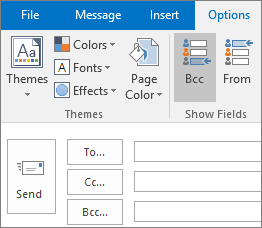
Did you know that when you send out a mass email, you can send them as a BCC (Blind Carbon Copy) so that when someone hits Reply All, they are not replying to the entire campus?
After you turn on the Bcc box, it appears every time you create a message until it's turned off. The option to turn on the Bcc field can be found in two locations, depending on whether you are composing a new message or replying to or forwarding a message.
-
Create a new email message or reply to or forward an existing message.
-
If the message you're composing opens in a new window, select Options > Bcc.

If the message you're composing opens in the Reading Pane, select Bcc from the ribbon.
-
In the Bcc box, add recipients, compose the message, and choose Send when done.
Turn off Bcc
You can turn off the Bcc box for future messages at any time.
-
Create a new email message or reply to or forward an existing message.
-
If the message you're composing opens in a new window, select Options > Bcc.

If the message you're composing opens in the Reading Pane, select Bcc from the ribbon.
Note: The background color distinguishes between the Bcc button being turned on or turned off. A dark background means the button is turned on, and a light background means it's turned off.
View Bcc recipients
If you're the recipient of a message, you can't see whether the sender added Bcc recipients. Only the sender of a message can see the names of Bcc recipients by opening a message in the Sent Items folder where all sent messages are stored by default.
-
In the Sent Items folder, open the message that you sent.
-
In the Reading Pane, view the header section of the message.
